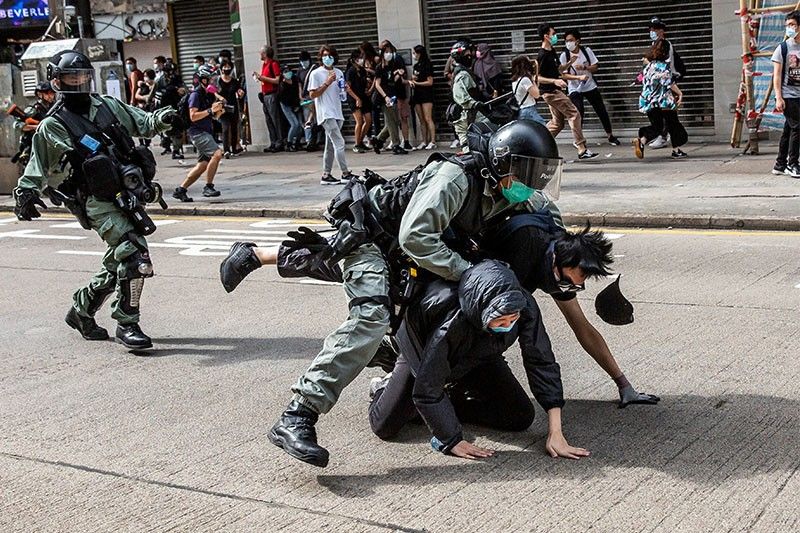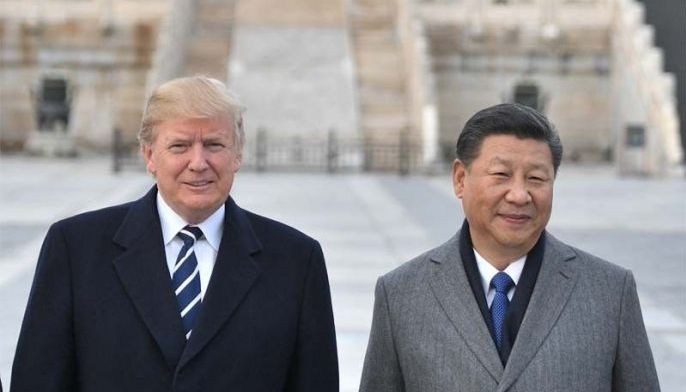China threatens US counter measures if punished for Hong Kong law

HONG KONG, China — China on Monday threatened counter measures against the United States if it is punished for plans to impose on Hong Kong a sedition law, which the business hub's security chief hailed as a new tool to defeat "terrorism".
Beijing plans to pass the new security law for Hong Kong that bans treason, subversion and sedition after months of massive, often-violent pro-democracy protests last year.
But many Hong Kongers, business groups and Western nations fear the proposal could be a death blow to the city's treasured freedoms, and thousands took to the streets on Sunday despite a ban on mass gatherings introduced to combat coronavirus.
As police dispersed the crowds with tear gas and water cannon, Washington's national security advisor Robert O'Brien warned the new law could cost the city its preferential US trading status.
But China's foreign ministry said Beijing would react to any sanctions from Washington.
"If the US insists on hurting China's interests, China will have to take every necessary measure to counter and oppose this," foreign ministry spokesman Zhao Lijian told reporters on Monday.
Hong Kong has become the latest flashpoint in soaring tensions between the world's two superpowers which China has likened to "the brink of a new Cold War".
The refusal to grant Hong Kongers democracy has sparked rare bipartisan support in an otherwise bitterly divided Washington during the Trump administration.
Beijing portrays the city's protests as a foreign-backed plot to destabilise the motherland and says other nations have no right to interfere in how the international business hub is run.
Mainland agents?
Protesters, who have hit the streets in their millions, say they are motivated by years of Beijing chipping away at the city's freedoms since it was handed back to China by Britain in 1997.
Hong Kong enjoys liberties unseen on the mainland, as well as its own legal system and trade status.
Campaigners view the security law proposal as the most brazen move yet by Beijing to end free speech and the city's ability to make its own laws.
Of particular concern is a provision allowing Chinese security agents to operate in Hong Kong, with fears it could spark a crackdown on those voicing dissent against China's communist rulers.
On the mainland, subversion laws are routinely wielded against critics.
The proposed law, which China's rubber-stamp legislature is expected to act on quickly, will also bypass Hong Kong's own legislature.
The city's influential Bar Association on Monday described the proposed motion as "worrying and problematic" -- and warned it may even breach the territory's mini-constitution.
The proposal has spooked investors with Hong Kong's stock exchange suffering its largest drop in five years on Friday. On Monday it had yet to recover, closing just 0.10 percent up.
'Restore social order'
Hong Kong's unpopular pro-Beijing government has welcomed the law.
"Terrorism is growing in the city and activities which harm national security, such as 'Hong Kong independence', become more rampant," security minister John Lee said in a statement welcoming the planned legislation.
Police chief Chris Tang cited 14 recent cases where explosives had been seized and said the new law would "help combat the force of 'Hong Kong independence' and restore social order".
Last year's protests were initially sparked by plans to allow extraditions to the mainland but soon snowballed into a popular revolt against Beijing and the city's police force.
Beijing has dismissed protester demands for an inquiry into the police, amnesty for the 8,500 people arrested and universal suffrage.
The demonstrations fizzled at the start of the year as mass arrests and the coronavirus took their toll.
But they have rekindled in recent weeks with Sunday's rally producing the most intense clashes for months and police making at least 120 arrests.
During last year's huge pro-democracy rallies, mob attacks were common on both sides of the political divide and a video of protesters beating a lawyer at Sunday's rally was seized on by China's state media.
Hu Xijin, editor-in-chief of the nationalist tabloid Global Times, posted the video on Twitter -- a platform banned in mainland China.
"Let's see what the Washington-backed Hong Kong democracy really looks like," he wrote.
Millions march in Hong Kong in a powerful rebuke of an extradition law feared to expose them to China's capricious justice system.
Hong Kong national security police on Thursday detained four people, including the brother of prominent activist Dennis Kwok, one of eight fugitives with bounties on their heads for allegedly breaching national security.
The city's national security department "took in two men and two women from various districts in Hong Kong and Kowloon for investigation," a police source told AFP.
Among the four was the elder brother of former democracy lawmaker Dennis Kwok, who is currently in the United States.
"(Kwok's elder brother) is now under investigation in the Western District police station," the source said.
Three others, "two women and a man", were taken in Tuesday by the national security department, authorities told AFP earlier Thursday.
AFP has requested comment from police on the most recent detentions. — AFP
Three family members of exiled democracy activist Nathan Law have been taken in for questioning on Tuesday, days after authorities issued a bounty on him and seven others accused of breaching the city's national security law.
Police officers from the national security department brought in Law's parents and elder brother without formally arresting them, a police source confirmed to AFP.
"It's understood that officers from the NSD took three people -- Nathan Law's parents and elder brother -- in for questioning," they said.
"So far, no arrest has been made." — AFP
The United States condemns Hong Kong authorities for issuing bounties linked to democracy activists based abroad, saying the move sets a dangerous precedent that could threaten human rights.
Hong Kong police offered bounties of HK$1 million (about $127,600) for information leading to the capture of eight prominent dissidents who live abroad and are wanted for national security crimes.
"The United States condemns the Hong Kong Police Force's issuance of an international bounty" against the eight activists, State Department spokesperson Matthew Miller says in a statement.
"The extraterritorial application of the Beijing-imposed National Security Law is a dangerous precedent that threatens the human rights and fundamental freedoms of people all over the world," he adds, saying China is engaging in "transnational repression efforts."
"We call on the Hong Kong government to immediately withdraw this bounty, respect other countries' sovereignty, and stop the international assertion of the National Security Law imposed by Beijing." — AFP
Hong Kong's top court has quashed the conviction of a journalist in relation to her investigation into an attack on democracy supporters by government loyalists in 2019.
It was a rare victory for the press industry in a city where two major independent news outlets have been forced to shut down since Beijing imposed a national security law in 2020.
"Happy -- I could not think of another word that can describe my mood right now," veteran journalist Bao Choy said outside the Court of Final Appeal after the judgement was handed down.
"I think this kind of happiness belongs to everyone in society." — AFP
Hong Kong police detained Alexandra Wong, a prominent democracy activist better known as "Grandma Wong" on Sunday, the 34th anniversary of the Tiananmen Square crackdown, AFP reporters said.
Wong was carrying flowers in Hong Kong's Causeway Bay shopping district, an area that for years was the site of June 4, 1989, commemorations, before authorities escorted her to a police van. AFP reporters saw a total of six people bundled into police vehicles. — AFP
- Latest
- Trending
































